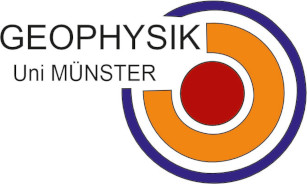Student perspectives ...
Jan
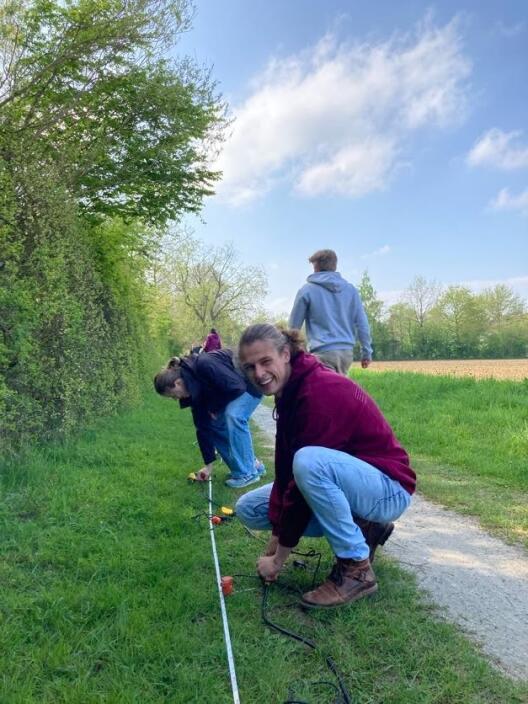
© J. Schwarte Jan, BSc Geophysics, 4th semester
My motivation to start studying geophysics in Münster was, on the one hand, the varied study content and, on the other hand, the city of Münster, which is known as a student-friendly cycling city.
The course of study consists of several modules in physics, mathematics, geosciences and, of course, geophysics. It is precisely this combination that makes the degree programme very unique. In the first semesters, you deal a lot with the basics of physics and mathematics, which is supplemented by individual lectures in geoscience and geophysics. Admittedly, the time can be very exhausting and demands a lot from you. However, you can get through the time well with your fellow students, as there is a very familiar atmosphere in the institute and you quickly make friends across semesters.
In the following semesters, the focus on geophysics is much higher. In addition, you have a wide range of options with regard to the geosciences modules (planetology/petrology/structural geology/etc.). To get an overview of this, you can simply take a look at the examination regulations. And until the modules have to be taken, you can ask around in the other semesters which modules are the most interesting, coolest or even easiest. The situation is similar with the module "Interdisciplinary Studies". In this module, you can choose almost any module at Münster University. Among other things, I take the climatology lecture, fellow students have taken the volcanism lecture or chemistry modules. Furthermore, at the end of the fourth semester, you go on an international field course, on which geophysical studies are carried out together with foreign partner universities in regions that change every year. I'm really looking forward to it - we're going to France!
The geophysics modules are by far the most interesting. You get more and more insights into the three working groups in Münster. The professors are happy to report on current research projects and show you where and how you can get involved in the future (keyword: Bachelor thesis). I only recently became aware of how international the degree programme and the research area are. Everyone works together in foreign collaborations. The department is not particularly large, which put me off at first, but this allows you to get to know many people very quickly and you can knock on professors' doors and ask questions without any problems. Here at the institute, everyone is really interested in making sure that you get a lot out of your studies and have a good time at the same time.
If you have any questions, please contact the student council!
Best regards and maybe see you soon!
Kimya
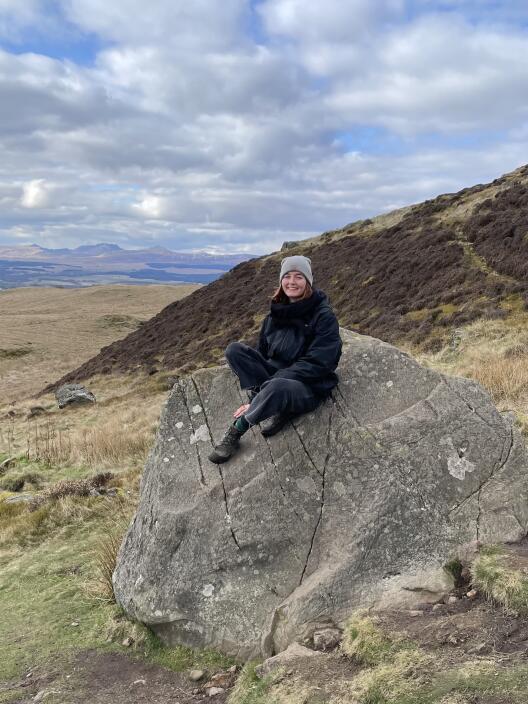
© K. Vallenton Kimya, BSc Geophysics, 4th semester
Hi, I'm Kimya and I'm currently in my fourth semester studying geophysics in my bachelor's degree, although it's difficult to say with the semester, because I'm actually doing gymnastics in all semesters. Officially, I'm "only" a second student, because I'm actually studying social work in my bachelor's degree and am writing my bachelor's thesis there. My motivation to start a second degree at the same time was due to both Corona and my interest in studying natural sciences.
In the meantime, I'm definitely studying more geophysics than social work, even if I'm studying anything but ideal. In my officially first geophysics semester, I did an internship in Hamburg and therefore only started in the second semester with Mathematics 2, an introduction to applied geophysics and an introduction to experimental work. In addition, I dropped out of physics after the ninth grade, didn't have a scientific focus and my Abitur was five years ago when I graduated (I could still vaguely remember how integrating and deriving works), so I was overwhelmed in mine first two proper semesters. Back then I had to struggle a lot, especially with Physics 1, but I passed it in the end. My experience was and is that, in addition to prior knowledge, it is much more important during your studies to stay on the ball, not give up and ask for help! And especially in geophysics, you literally run into open doors with questions about lectures, exercises or more.
The Geophysics Institute in Münster is a small and rather informal institute, so not only is there contact between students over the course of the semester, but also on first-name terms with most lecturers over the course of the semester. Events such as "Geophysicists: in im Profession", regulars' tables or festivals such as Christmas parties, barbecues or summer parties, to which the entire institute of inclusive students is often invited. Because of the family character and although I was only back in Münster for the second semester, I made friends very quickly and was welcomed with open arms. I can highly recommend getting involved and exchanging ideas with the institute, even if only with the other students. If you are interested in an internship in Germany or abroad, you can also contact the lecturers without any problems, they will be happy to offer help in finding an internship for voluntary internships in Germany and abroad and to network you with possible positions.
Münster itself is a student city and offers a wide range of university sports, student initiatives and student life in general. Actually, everyone goes to the university by bicycle or “Leetze”, Münster also has its own “bicycle highway” for this purpose, which once encircles the city center. Most spend the summer at the canal swimming or enjoying the sun and the winter at one of the various Christmas markets.For me it was a good decision to have enrolled in geophysics. I'm glad that I got to know new nice people through my studies and I find it exciting to deal with the various geophysical topics.
If you have any further questions, about your studies or specifically about the topic of second students, don't hesitate to write to our student council!
Moritz
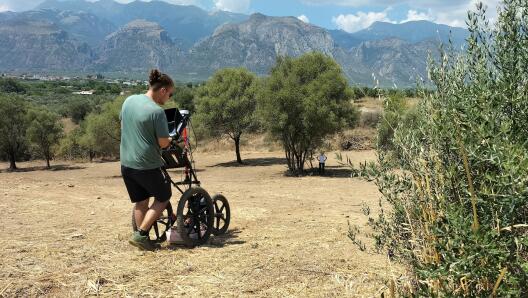
Archeological prospection near Sparta (2022)© M. Wendel Moritz, BSc Geophysics, 6th semester
My geophysics studies in Münster are very demanding, but also very fulfilling. I particularly like the strong physical orientation, even though it can often lead to intensive learning phases and sometimes also to a certain despair. However, thanks to the cohesion among the students, these problems could be overcome.
Since the math-heavy physics is balanced out by various earth science courses, the programme is very versatile and covers a wide range of knowledge.One part of studying in Münster that I particularly like is the family-like relationship between the students and the lecturers, research assistants and doctoral students. I would also like to highlight my participation in a measurement trip to Greece to carry out archaeo-physical measurements (see photo), which I subsequently wrote my Bachelor's thesis on. I was also given the opportunity to gain practical experience of working as a geophysicist during other campaigns as a measurement assistant.
Hannah
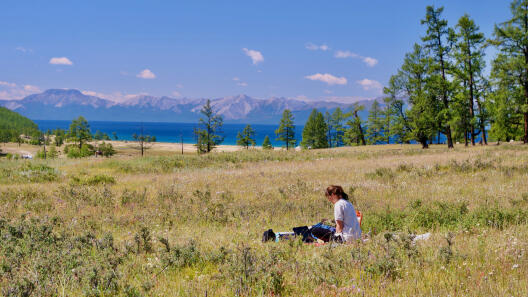
... on a geophysical field expedition in Mongolia (2022)© M. Becken Hannah, Master's student
Hi, I'm Hannah and after a bachelor's degree in physics I came to Münster to do a geophysics master's degree. There are personal and professional reasons why this was a brilliant decision:
First of all, the contrast to my bachelor years in a grey Ruhr city didn't make it hard for me to like Münster and feel comfortable here. Everyone knows that Münster is a study city, and I can absolutely confirm that!
The Master's in Geophysics comes without geophysical electives, but with a wide range of course content from fluid dynamics, seismology and magnetotellurics to geophysical data processing and numerical simulation, modelling and inversion. I chose to study geophysics in Münster because it is one of the few locations where geophysics is part of the physics department and thus has a strong physical focus - if you choose it accordingly. I was able to take only physics modules here in addition to the geophysics courses (materials physics is my absolute recommendation!). However, I also had a look at geoscientific courses - admittedly, with my physics background, I was initially put off as to whether I would understand anything there at all, but you should think outside the box, shouldn't you? - and found a wide range of very interesting courses there, such as Introduction to Organic Petrology or Climatology, which I can advise everyone to take.The institute is very small and familiar probably describes the atmosphere best: like in an extended family, the atmosphere is very familiar, many are unconditionally helpful - whether with study-related or private problems - and there is a lot of gossip wafting through the corridors. I guess you have to like that, but I can only recommend getting involved and actively participating. In the past few years, I have not only found it easy to make friends despite Corona, but I have also made some really good friends. The small student body (in the Master's programme, you only sit in small groups in the courses!) combined with a close supervisory relationship with lecturers only brings advantages in my opinion: In concrete terms, this means extensive individual support with course content (Your code isn't running as it should? Rescue is coming from the office next door), tailored student assistantships to get involved with research topics of the research groups beyond the curriculum (during my Master's degree I had student assistantships in seismology, materials physics, applied geophysics and was a measurement assistant in Mongolia), the opportunity to gain deep insights into current research topics (this was particularly crucial for me, because I came to Münster without much of a plan for geophysics) and, above all, individual support and exclusive opportunities to gain experience (participation in conferences, internships, project meetings, excursions, etc.).
If you have further questions about the study in general or especially about the change from physics to geophysics, don't hesitate to write to our student council!
Johanna
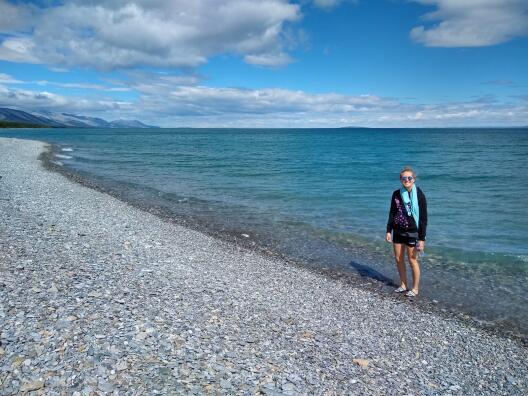
... on a geophysical field expedition in Mongolia (2022)© J. Plett Johanna, Master's student
It was clear to me quite early on that I would like to study natural sciences. My motto was: I want to do something with math and physics, but not math and physics. Sounds paradoxical at first, but it really just means that I was looking for something in the applied, interdisciplinary direction.
During high school, I was very interested in the universe and accordingly looked for universities where you can study astrophysics, for example. In the course of this, I came across a course called geophysics, a mix of math, physics and earth sciences. Sounds exactly like what I was looking for, how convenient! Without further ado, I visited the University Day in Münster and the Geophysics info session as well as the student council and felt immediately welcome.
In the spring of 2016, I graduated from high school and in October, I directly started studying geophysics in Münster - very nice city, just by the way. In contrast to other universities, the focus here is on basic physics and less on geosciences, so the first three semesters are basically like studying physics with geophysics as a minor, which is definitely no walk in the park. The path to success, however, is both here and in the later course of study: Always study together and calculate exercise sheets. That means: shared suffering and twice the fun!
Once you have mastered the first part, there is not much that can go wrong - and from the 4th semester on, I really enjoyed geophysics when it was time to go into the field! The international field course was part of my undergraduate studies and is based on a cooperation with the universities from Edinburgh (UK) and Paris (France). For me, it went to England in 2018, where we spent a week trying out and evaluating geophysical measurement methods with students from the other universities.
But even away from the study schedule, you get plenty of opportunities to interact with other students, for example at the GAP (Geophysical Action Program), where all geophysics students from Germany who feel like it get together for a long weekend in a different city every year.
The biggest plus point of studying geophysics in Münster? Definitely the family atmosphere. Since we're a fairly small institute where all the offices are on the same floor, you know every face here. So you know directly where to find the best contact point for problems. The computer doesn't work the way you want it to? Off to the IT office. Is your head starting to smoke again? Go to the coffee break with your fellow students (who, by the way, have also become good friends). You're up for an internship? Go to the professors, they usually have a clever idea and contacts ready.In the meantime, I have reached the end of my master's degree and have taken some time to think outside the box. This includes an internship in Rostock, a trip with a research vessel and a measurement trip to Mongolia. Looking back, these are definitely the experiences that complete the degree for me and I can recommend everyone to take advantage of such opportunities.
Caro
Caro, Master's student
I completed both my bachelor's and master's degree in geophysics at the University of Münster.
Since our degree program is quite small, it doesn't take long for the students to get to know each other and develop friendships. Solving exercise sheets together and learning for exams are tasks that you don't have to do alone. Beyond the general social interaction, the different perspectives thus experienced also contribute to the understanding of problems.
Due to the limited size of the institute, you also quickly get to know the teachers and other members of the institute and you quickly get to know them by name. This sometimes almost family-like atmosphere means that the teachers always take the time to respond individually to the students' questions and problems. In addition, the professors of our institute helped us to get internships and semesters abroad by putting us in contact with other geophysicists.
I particularly enjoyed the measurements in the field, which are carried out in both the bachelor's and master's courses. The subsoil is examined using ground-penetrating radar as well as geoelectric, geomagnetic and seismic measurement methods, for example to determine the depth of the groundwater table or to find remains of archaeological interest. Experience with these measuring methods opens up many career opportunities after graduation, for example in explosive ordnance clearance or the search for raw materials.
Anyone who feels more comfortable in front of a PC than in the open air is also in good hands with a geophysics degree in Münster. Here you also learn how to use different programming languages and numerical modelling. Such IT skills are sought after in many industries these days and of course make a good impression on a CV.
All in all, I found the geophysics course in Münster not only technically interesting, but also fun and fulfilling.

